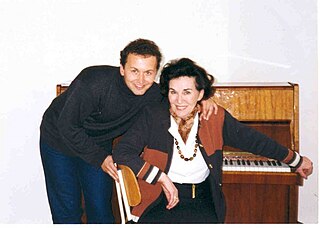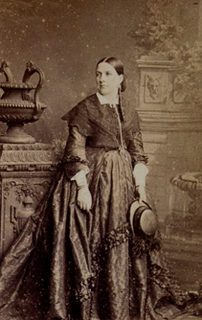
Caroline Barbot, born in Paris 27 April 1830, died 17 September 1893, was a French operatic soprano. She is most notable for creating the role of Leonora in "La Forza del Destino" by Verdi in Saint Petersburg, Russia, in 1862. [1]

Caroline Barbot, born in Paris 27 April 1830, died 17 September 1893, was a French operatic soprano. She is most notable for creating the role of Leonora in "La Forza del Destino" by Verdi in Saint Petersburg, Russia, in 1862. [1]
Caroline Barbot studied at the Paris Conservatoire with Manuel Garcia the younger and won first prize for singing upon completion of her studies in 1850. She married the tenor Joseph-Théodore-Désiré Barbot and appeared with him in operas in France, Belgium, Italy and Russia. Upon their return to Paris, her husband created the role of Faust in Gounod's opera of the same name at the Théâtre Lyrique while Caroline appeared in leading roles in operas by Bellini, Meyerbeer and Verdi at the Paris Opera. [2]
Verdi saw her in his opera "Les vêpres siciliennes" in Paris and chose her to create the leading role of Leonora in his opera "La Forza del Destino" in St.Petersburg. [3] The premiere was scheduled for 1861, but when Verdi arrived in Russia to supervise the rehearsals, Barbot was ill. Rather than accept a substitute in the leading role of Leonora, Verdi returned to Italy and came back to Russia the following season where the opera achieved great success with Barbot, as planned, as Leonora. [4] Caroline appeared with her husband in subsequent seasons in Russia, and she continued her international career in France, Italy and England until 1872. [2] Her husband became a singing teacher at the Conservatoire in Paris upon his retirement from the stage, and Caroline died in that city in 1893.

Maria Anna MarziaAlboni was a renowned Italian contralto opera singer. She is considered "one of the greatest contraltos in operatic history".

La forza del destino is an Italian opera by Giuseppe Verdi. The libretto was written by Francesco Maria Piave based on a Spanish drama, Don Álvaro o la fuerza del sino (1835), by Ángel de Saavedra, 3rd Duke of Rivas, with a scene adapted from Friedrich Schiller's Wallensteins Lager. It was first performed in the Bolshoi Kamenny Theatre of Saint Petersburg, Russia, on 29 November 1862 O.S..

Maria Antonietta Stella was an Italian operatic soprano, and one of the most prominent Italian spinto sopranos of the 1950s and 1960s. She made her debut in Spoleto in 1950, as Leonora in Verdi's Il trovatore, a year later at Rome Opera, as Leonora in La forza del destino, in 1954 at La Scala in Milan, as Desdemona in Otello, in 1955 at the Royal Opera House in London as Aida, and in 1956 at the Metropolitan Opera in New York City, in the same role.

Radmila Bakočević, is a Serbian operatic soprano who had a major international opera career that began in 1955 and ended upon her retirement from the stage in 2004. During her career, she sang at most of the world's important opera houses, including performances throughout Europe, North and South America. She forged important long-term artistic partnerships with two opera houses during her career: the National Theatre in Belgrade and the Vienna State Opera.

Romilda Pantaleoni was an Italian soprano who had a prolific opera career in Italy during the 1870s and 1880s. She sang a wide repertoire that encompassed bel canto roles, Italian and French grand opera, verismo operas, and the German operas of Richard Wagner. She became particularly associated with the roles of Margherita in Boito's Mefistofele and the title role in Ponchielli's La Gioconda; two roles which she performed in opera houses throughout Italy. She is best remembered today for originating the roles of Desdemona in Giuseppe Verdi's Otello (1887) and Tigrana in Giacomo Puccini's Edgar (1889). Universally admired for her acting skills as well as her singing abilities, Pantaleoni was compared by several critics to the great Italian stage actress Eleonora Duse.

Teresa Stolz was a Bohemian soprano, long resident in Italy, who was associated with significant premieres of the works of Giuseppe Verdi, and may have been his mistress. She has been described as "the Verdian dramatic soprano par excellence, powerful, passionate in utterance, but dignified in manner and secure in tone and control".

Rosine Bloch was a French operatic mezzo-soprano of Jewish descent who had a successful stage career in Europe between 1865 and 1891. She not only possessed a beautiful, warm, and lyrical voice but was also a remarkably beautiful woman physically. Although most of her career was spent performing at the Opéra in Paris, she also appeared in stages in Belgium, Monaco, and England.

Rose Caron was a French operatic soprano.

Nikolay Figner (1857–1918), lyric tenor, and Medea Figner (1859–1952), mezzo-soprano, later soprano, were a husband-and-wife team of opera singers active in Russia between 1889 and 1904. Medea was Italian-born but she became completely Russianized after marrying Nikolay. They had separate careers before their wedding, and again after their divorce in 1904, but during the 15 years of their marriage they almost always sang in the same performances. They created the main tenor and soprano roles in two operas by Pyotr Ilyich Tchaikovsky – The Queen of Spades and Iolanta – and appeared in a number of other important Russian musical premieres.

Theresia Singer was an operatic soprano.

Susan Salms-Moss is an opera singer who made her career singing leading soprano roles throughout Europe. She has appeared in numerous theaters in Germany, as well as in Austria, France, Switzerland, Slovenia and the Czech Republic, and is known for her portrayal of psychologically complex characters.

Maria Spezia-Aldighieri (1828–1907) was an Italian operatic soprano who had an active international career from 1849 up into the 1870s. She excelled in the coloratura soprano repertoire and was particularly admired for her portrayals in the operas of Giuseppe Verdi. Her performance of Violetta in Verdi's La traviata at the Teatro San Benedetto in Venice in 1854 is credited with popularizing the opera after it had initially flopped at its premiere in 1853. She was married to baritone Gottardo Aldighieri and is the great grandmother of singer George Aaron.

Marie Constance Sasse [Sax, Saxe, Sass] was a Belgian operatic soprano. "Her voice was powerful, flexible, and appealing", and she was one of the leading sopranos at the Paris Opéra from 1860 to 1870. She created the roles of Elisabeth in the Paris premiere of Wagner's Tannhäuser, Sélika in the world premiere of Meyerbeer's L'Africaine, and Elisabeth de Valois in the world premiere of Verdi's Don Carlos.

Marie-Gabrielle Krauss was an important 19th century Austrian-born French operatic soprano. She created major roles in operas by Anton Rubinstein, Charles Gounod, Camille Saint-Saëns, Auguste Mermet, Clémence de Grandval, Errico Petrella, Antônio Carlos Gomes and Émile Paladilhe. She also created roles in local premieres of Verdi and Wagner operas. Krauss was a leading soprano at the Paris Opera for 13 years, and also sang with great success in Italy and Russia.
Sigutė Stonytė is a Lithuanian soprano and professor at the Lithuanian Academy of Music and Theatre.

Constance Nantier-Didiée was a French mezzo-soprano. According to commentators of her time, she was described as a true mezzo-soprano rather than a contralto. She had a wide range of comic, dramatic and travesty roles in her theatrical career developed in Paris, London, Moscow and Madrid.

Jeanne-Anaïs Castellan, born in Beaujeu, Rhône on 26 October 1819, died in Paris 1861, was a French soprano. She is most notable for creating the part of Berthe in Le prophète by Meyerbeer.

Rosina Penco was an Italian operatic soprano. She is most notable for creating the role of Leonora in "Il trovatore" by Verdi in Rome in 1853.

Joseph-Théodore-Désiré Barbot, born in Toulouse on 12 April 1824, died in Paris on 1 January 1879, was a French operatic tenor. He is most notable for creating the title role in Charles Gounod's opera "Faust".

Yvonne Dubel (1881–1958) was a French operatic soprano from Rennes. After completing her studies at the city's Conservatoire, she débuted in 1904 at the Paris Opera as Elsa in Wagner's Lohengrin. In March 1911 at the Monte Carlo Opera, she created the role of Iole in Déjanire by Saint-Saëns. In addition to guest appearances in the French provinces (1907–1912), she performed in countries across Europe, including Belgium, Germany, Greece and the Netherlands.